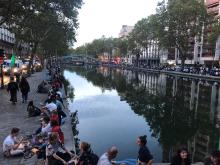Paris, France
This program is sponsored by the Department of French and Italian Studies and co-sponsored by CHID.
The "Cultural and Environmental Memory in Paris" program focuses broadly on contemporary queer and ecological cultures in Paris by engaging sites (neighborhoods, monuments, land/cityscapes) and texts (literature, cinema/TV, from the current moment that bring the specificity of those cultures to life but also by digging into their often-obscured histories. Paris is an ideal site for a program that provides the tools for unearthing the unknown, the hidden, and the underappreciated in urban contexts. As a top-10 global tourist destination with over 17 million visitors in 2024, Paris is overloaded as a symbol of History (through its monuments and museums), romance, fashion, and the arts and culture (think Netflix’s Emily in Paris). This program endeavors to explore Paris beyond the clichés via engagement with queer and eco-cultural spaces (“gayborhoods,” sites of ecological rehabilitation or “re-greening” of the city) in dialogue with various forms of creative expression. The work we do together will allow for an understanding of a place in all its complexity as well as numerous opportunities for the group to experience surprise, delight, and a deeper sense of connection to a city that presents itself as one thing but is many.
The program’s two 5-credit courses–one on queer citizenship in Paris, the other on Paris as a site of radical environmental thought in a time of accelerating climate change–will blend vibrant classroom discussions with regular field excursions throughout the city. Some excursions will foreground queer Paris, others Paris as site of eco-cultural experimentation, and sometimes both at once. For instance, Le Marais [literally, The Swamp], a “quartier” (neighborhood) in the center of Paris, is important in the history of queer recognition in Paris and beyond at the same time that it provides a window into urban ecological reclamation (the “swamp” was drained and transformed from a district known for criminality and disease to a gentrified place of health and wealth). How, we’ll ask throughout, do these histories of urban cultural and ecological transformation intersect and interact to give us the Paris of the present? And how can marginalized communities, practices, and discourses cast a different light on a place we think we know? Finally, students will have the option to practice conversational French, whether they have experience in the language or not.
- FRENCH 228 / CHID 479: The Water Crisis in Literature and Film (5 credits, SSc for FRENCH, A&H for CHID)
- FRENCH 223 / CHID 471: Sex, Commerce and the Making of Modern Paris (5 credits, SSc and DIV for FRENCH, SSc for CHID)
*Note that the fees stated above do not include some additional costs, including, but not limited to: airfare and personal spending money. These costs will differ by program. Be sure to read our Fees, Financing, and Withdrawal information for details about the fee structure and payment schedule.
